While royal coronations may be centred around events at Westminster Abbey and the London area, coronation celebrations have long been taking place nationwide. Copyright records from the Stationers’ Company (1842-1912), now held at The National Archives, can provide an unusual insight into what went on up and down the country on coronation days. In this blog I’ll be focusing in on celebrations for the Coronation of Edward VII.
Following the death of Queen Victoria in 1901, preparations began for the coronation of her eldest son Edward and his wife Alexandra. Victoria’s coronation, six decades earlier, had been very disorganised, and officials were keen to avoid this happening again. By the dawn of the twentieth century, the British public had also become accustomed to a certain degree of royal pomp and ceremony, having recently experienced both a golden and diamond jubilee.
An Executive Coronation Committee was established, led by Viscount Esher, who had successfully organised Victoria’s Diamond Jubilee four years earlier. The date for Edward’s coronation was set to be 26 June 1902.[ref]David Cannadine, ‘The Context, Performance and Meaning of Ritual: The British Monarchy and the ‘Invention of Tradition’, c. 1820-1977’ in Eric Hobsbawm and Terence Ranger (eds.), The Invention of Tradition, (Cambridge, 1983), pp. 134-5.[/ref]
Local coronation festivities
As well as the ceremony and procession in London, events were organised in towns and villages all over the country. Copyright records give us a small insight into the local events that were being planned, as town committees and individuals published books, leaflets and musical scores to celebrate King Edward’s Coronation, and sent them to Stationers’ Hall to protect them under the Copyright Act of 1842.
In Hastings, on the south coast of England, this official programme was prepared to let residents know about the Coronation Day Festivities planned for 26 June. The front page boasted performances from the Phoenix Band, the Empire Theatre of Varieties Band and the Fisher Lads’ Naval Brigade Band.
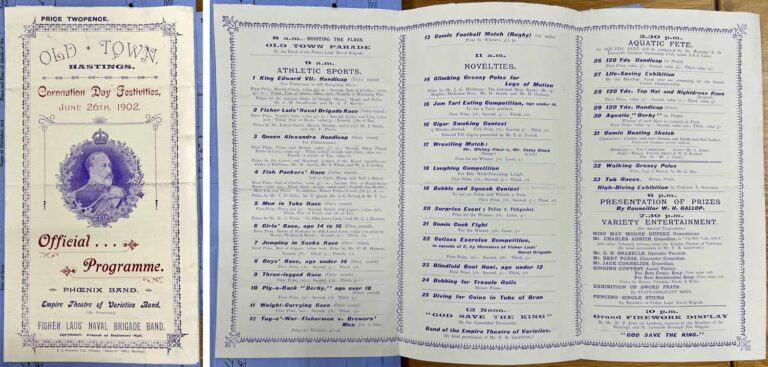
Inside a dizzying array of events was advertised including ‘Climbing greasy poles for legs of mutton’, a jam tart eating competition, a cigar smoking contest, a laughing competition and a surprise event described as ‘police versus pickpocket’. The festivities also included an aquatic fete organised by the Hastings and St Leonards Amateur Swimming Club.[ref]Hastings Coronation Day Festivities leaflet, 1902. Catalogue ref: COPY 1/771[/ref]
In Harborne, southwest of Birmingham, a souvenir of the Coronation Celebration was printed and registered for copyright protection. Its front cover is adorned with portraits of the King and Queen and inside it gives details of the planned church services, processions and sporting events.
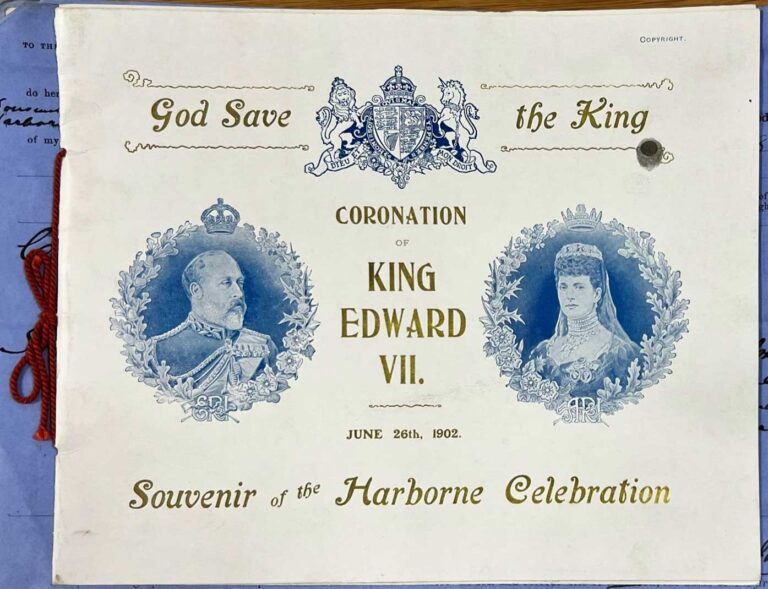
The streets were to be decorated with artificial floral streamers and the band stand illuminated in the evening. Activities included a children’s procession involving 1,550 children from local schools.[ref]Souvenir of the Harborne Celebration, 1902. Catalogue ref: COPY 1/772[/ref]
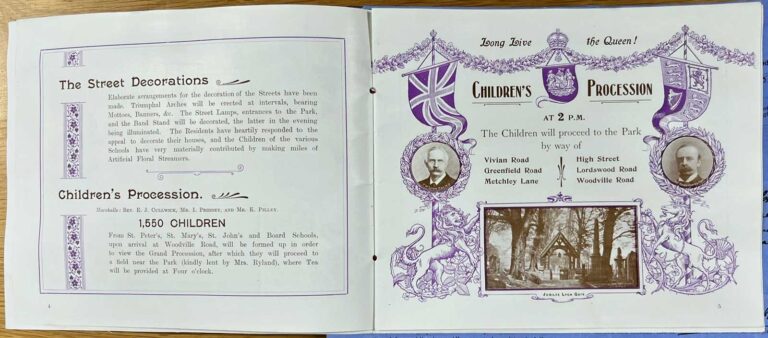
The Coronation postponed
Despite meticulous preparations all around Britain, the Coronation of Edward VII didn’t quite go to plan. The King was taken ill just two days before Coronation day and had to have an emergency operation. He reluctantly accepted that the Coronation would have to be postponed.
Urgent committee meetings were held up and down the country as officials had to decide which elements of their planned festivities to cancel and which to keep. The King reportedly wanted to encourage local activities to go ahead regardless of the postponement, however in some areas it was felt that the public would be so concerned by the King’s illness that they would not be in the right frame of mind for a full celebration.
The Hastings and St Leonards Observer reported on a special meeting of the Hastings Coronation Celebration Executive Committee which took place on the evening of Tuesday 24 June. After reporting news of the King’s illness, the Mayor of Hastings, Alderman Langham, JP, said ‘he was sure he voiced the feelings of everyone in the room and the town when he said how deeply grieved they all were at the news’.[ref]’The King’s Illness’, Hastings and St Leonards Observer, Saturday 28 June 1902, British Library.[/ref] He gave his thoughts on how to proceed:
‘They ought to go on with the Tea to the children and the Dinner to the Aged Poor. The King had expressed a [desire] to the effect that so far as the council generally was concerned [they should] proceed as if the Coronation [took place on the] day originally arranged, excepting certain matters which to his mind could not be properly and rightly carried out on that day.’
Hastings and St Leonards Observer, Saturday 28 June 1902
On 26 June, a more subdued programme of celebratory events was held across Britain. In most places, teas and dinners which had been organised for the benefit of schoolchildren, the elderly and the poor were scheduled to go ahead as planned. Decorations were often kept up and certain competitions, which would have been difficult to reschedule, went ahead. Altered church services also proceeded, with prayers for the King’s health.
The Coronation itself was rescheduled for 9 August and many of the festivities originally planned for June were reorganised and took place on that date.
Coronation day in London
The last-minute postponement of the Coronation meant that foreign dignitaries and military contingents had to leave London and were unable to return for the rescheduled date. The Coronation procession on 9 August therefore included representatives of the British Army, Royal Navy, Royal Marines and Colonial, Dominion and Indian forces.
This photograph shows the State Coach travelling in the Coronation Procession, and was taken by Benjamin Elgar and registered for copyright protection by Marion & Company Ltd, a well-known camera and photographic equipment manufacturer.[ref]Benjamin Elgar, ‘Photograph of the Coronation Procession of His Majesty King Edward VII, the State Coach’, 1902. Catalogue ref: COPY 1/456/347.[/ref]
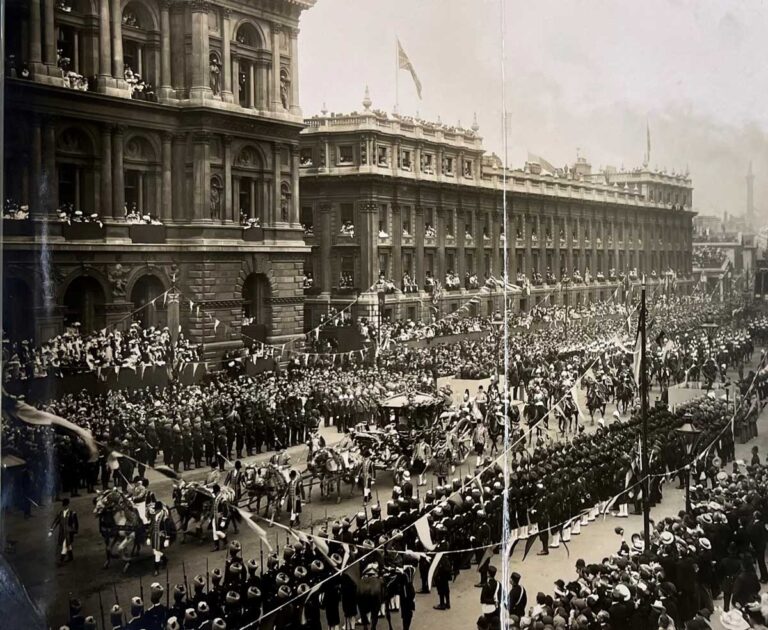
The Coronation ceremony in Westminster Abbey went largely to plan, with some small adaptations due to the King’s health. One hiccup occurred when the elderly Archbishop of Canterbury accidentally placed the crown on the King’s head back-to-front,[ref]’Edward VII’, Westminster Abbey, https://www.westminster-abbey.org/abbey-commemorations/royals/edward-vii [accessed 06/04/2023][/ref] but the ceremony was otherwise a success, with Queen Alexandra crowned straight after her husband.
While the procession was photographed and filmed, the British public were unable to see moving images of the Coronation ceremony. When film producer Charles Urban was denied permission to take cameras into Westminster Abbey to film the ceremony, he commissioned Georges Méliès to direct a short film simulating a condensed version of the ceremony with actors on an outdoor set.
The film was released on the evening of the Coronation, with real newsreel footage of the King’s carriage before and afterwards. While some criticised the film as a fake, most people praised it. King Edward VII himself was reportedly very pleased with the film.[ref]Elizabeth Ezra, George Méliès (Manchester, 1988), pp. 66-67.[/ref]
Celebrating through song
As well as organising public events, people around the country, both professional and amateur, wrote music to celebrate the Coronation. Many of these song sheets and musical scores were registered for copyright protection and so can be found at The National Archives.
This example, with music by Thomas M F Odell and verses written by J Trevor Williams, is titled ‘All Hail The King’.
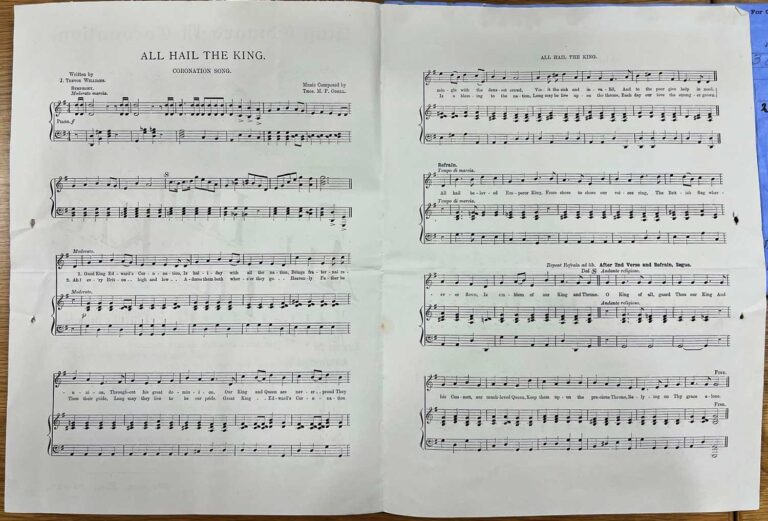
It includes the lyrics:
Good King Edward’s Coronation
Is holiday with all the nation
Brings fraternal reunion
Throughout his great dominion
Our King and Queen are never proud
They mingle with the densest crowd
Visit the sick and invalid
And to the poor give help in need.
‘All Hail The King’ by J Trevor Williams
Another titled ‘The Coronation Dude’ by Harry B. Norris was also published. While sadly the sheet music itself was not included with the registration form, the title page boasts how the song had been ‘sung with great success by Miss Vesta Tilley’.
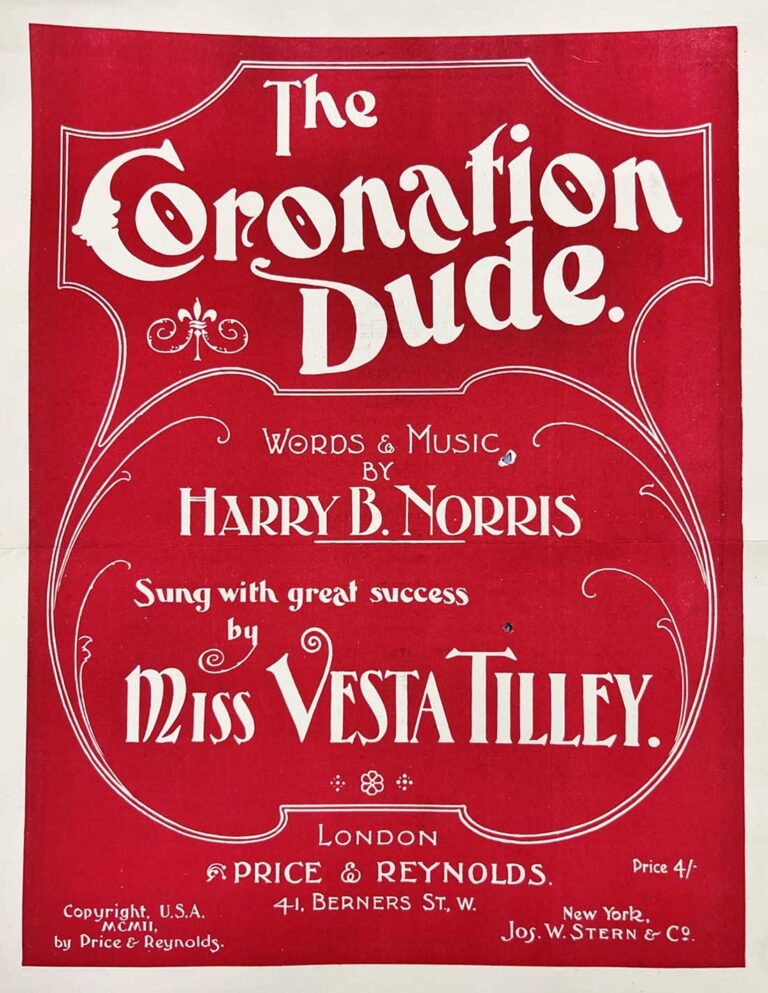
Vesta Tilley was a celebrated music hall performer, well known for her act as a male impersonator. Among other copyright records, you can find photographs of Vesta Tilley in various costumes.
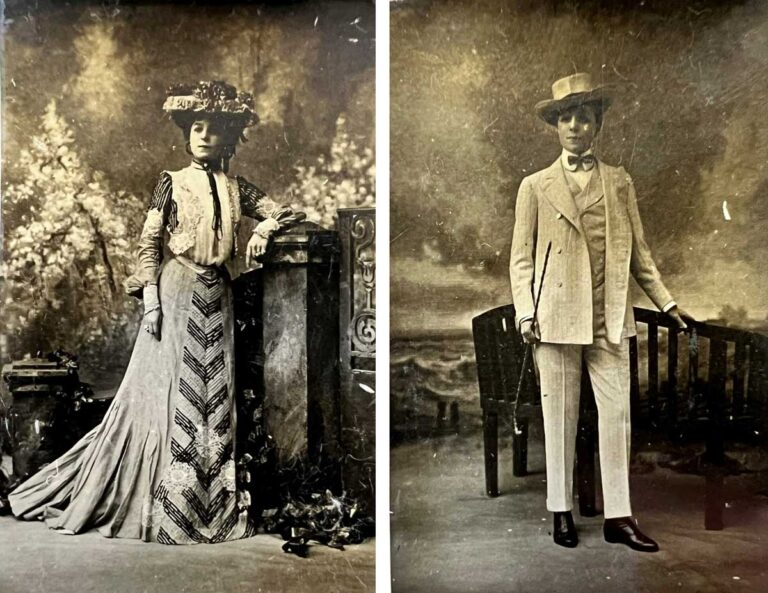
She performed the ‘The Coronation Dude’ as part of a varied repertoire at music halls all around the country. In May 1902 she performed at the Palace Theatre of Varieties in Manchester.[ref]’Miss Vesta Tilley at the Palace’, The Manchester City News, Saturday 31 May 1902, British Library.[/ref] The Manchester City News reported that:
‘Most of her selections were new to Manchester, and two were sung for the first time on Monday. They were called “On Furlough” and “The Coronation Dude.” Both were greeted with enthusiastic applause, and bid fair to become as popular as any other songs in Miss Tilley’s repertoire.’
Manchester City News, Saturday 31 May 1902
Another song titled ‘Coronation Morn’ was registered on 5 August 1902 by Alfred Lillywhite Jr, who also wrote the words and melody.[ref]’Coronation Morn’, catalogue ref: COPY 1/772.[/ref]
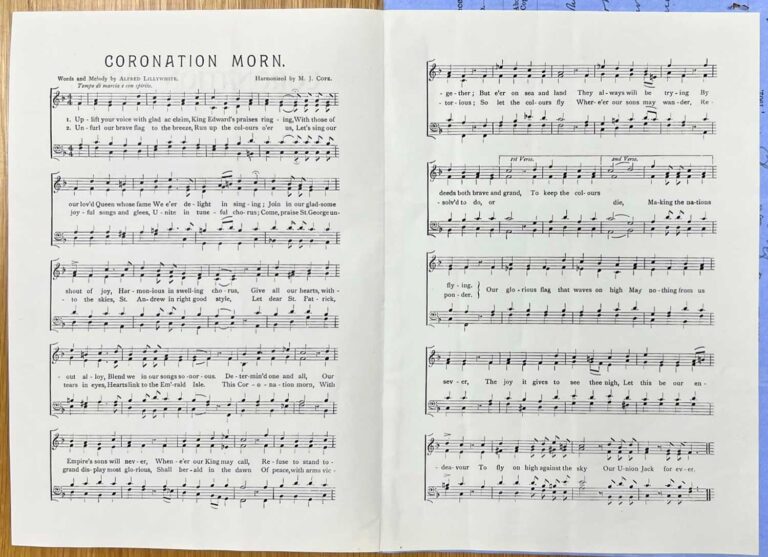
The lyrics draw upon patriotic and militaristic themes, common at the time, and include the verse:
This Coronation morn
With grand display most glorious
Shall be herald in the dawn
Of peace, with arms victorious
So let the colours fly
Where’er our sons may wander
Resolv’d to do, or die
‘Coronation Morn’ by Alfred Lillywhite Jr
Alfred Lillywhite Jr appears in the 1901 census as a widower living on Onslow Road in Richmond, Surrey, with his fifteen-year-old son and his sister-in-law. His occupation is listed as ‘Builder’. It seems then that his musical activities and publications were not his main profession but a successful hobby.[ref]The 1901 Census. Catalogue ref: RG 13/675 f. 35 p. 23. Find My Past, https://www.findmypast.co.uk/transcript?id=GBC%2F1901%2F0003359425[/ref]
The Stationers’ Company Copyright Collection held at The National Archives is particularly useful for uncovering lesser-known stories and individuals from around the country. To find out more about this collection and how to access it, please read our research guide to Intellectual property: photographs, artwork, literature, music and advertising registered for copyright 1842-1924.
Looking for info on performances by American Vaudeville dance team Dora Deen and Charles Johnson
at the Coronation of King Edward VII in 1902. Thanks for any assistance.
Historical research for Kentucky Music Heritage Foundation.